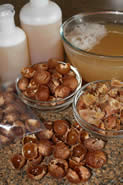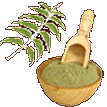|
ENGLISH |
SPANISH |
SANSKRIT |
BOTANICAL |
HINDI |
COMMON NAME |
FAMILY NAME |
GERMAN |
|
Soapnut Soap Nut |
Nueces de Jabón
Nuez de Sapindo |
Arishta Phenila |
Sapindus Mukorossi (North
India) Sapindus
Trifaliatus (South
India) |
Ritha |
Wash nut Reetha Chavakkai
Munippungu Urulinji Kumkuticettu Uruvanci |
Sapindaceae |
Waschnuss |
Soap nuts or Soapberry, also sometimes
referred to as Washing Nuts or Ritha / Reetha (in Hindi), contain
‘Saponins’, which have the ability to clean and wash. When in
contact with water, it creates a mild suds, which is similar to
soap. Soap nuts are naturally anti-fungal, antimicrobial,
biodegradable and hypoallergenic. Besides, used properly, they are
by far less expensive than the commercial chemical detergents.
TOXIC
CHEMICALS IN YOUR LAUNDRY DETERGENTS
Your everyday laundry detergents contain a combination of
many toxic chemicals, the residues of which are left behind
on your clothes after washing. This can be potentially
dangerous as these chemicals are absorbed by your skin into
your blood stream and also evaporate into the air, which you
and your children breathe. Both, the manufacturing process
of the chemical detergents and their use, have a long term
effect on the environment as well.
Most of your common laundry detergents contain phosphates,
ammonia, naphthalene, phenol, optical brighteners,
artificial fragrances, EDTA etc. These chemicals can cause
rashes, itches, allergies, sinus problems and have long term
toxic effects on the environment. |
There are trees in south Asian countries called
Soapnut trees on which natural soap grows. Yes it is true and
believable you can see natural soap on the trees in south Asian
countries. Soapnut trees grow 13 to 18 meters high. People of Asian
countries refer to the fruit of these trees as Reetha, Areetha, Kala
kamodi, Soapnuts andSoapberries. The fruit is harvested from
September to February. The Soapnut Tree plant's botanic family
includes 2,000 species.
 Soapnut trees have grown naturally, in the forest and hill track
areas (particularly in the Himal ayan range) for centuries. The
Soapnut is used as a natural soap, detergent, wash bar and cleaner
for all kinds of dirt removal. The Soapnut shells have also been
used for cleaning gold and silver ornaments for centuries in the
south and central Asian countries. Women throughout the entire
world, especially i n south Asian countries, have used Soapnuts as a
natural shampoo for their hair for thousands of years as it helps to
make hair strong, healthy, long and silky. Soapnuts are particularly
effective in treating dandruff, headlice and many other diseases of
the hair and scalp. Once planted, it takes nine years for the
Soapnut tree to begin yielding fruit. After the ninth year the
Soapnut trees can be harvested for a period of ninety years. Thus
the Soapnut tree’s life cycle is extremely long, allowing a natural
and sustainable cultivation. In addition to this, the Soapnut tree
contributes to combating the greenhouse effect by converting carbon
dioxide into oxygen. The more trees we allow to remain growing in
the earth, the better for our earth, atmosphere and ourselves.
Soapnut trees have grown naturally, in the forest and hill track
areas (particularly in the Himal ayan range) for centuries. The
Soapnut is used as a natural soap, detergent, wash bar and cleaner
for all kinds of dirt removal. The Soapnut shells have also been
used for cleaning gold and silver ornaments for centuries in the
south and central Asian countries. Women throughout the entire
world, especially i n south Asian countries, have used Soapnuts as a
natural shampoo for their hair for thousands of years as it helps to
make hair strong, healthy, long and silky. Soapnuts are particularly
effective in treating dandruff, headlice and many other diseases of
the hair and scalp. Once planted, it takes nine years for the
Soapnut tree to begin yielding fruit. After the ninth year the
Soapnut trees can be harvested for a period of ninety years. Thus
the Soapnut tree’s life cycle is extremely long, allowing a natural
and sustainable cultivation. In addition to this, the Soapnut tree
contributes to combating the greenhouse effect by converting carbon
dioxide into oxygen. The more trees we allow to remain growing in
the earth, the better for our earth, atmosphere and ourselves.
The used shells of the Soapnuts are 100%
biodegradable, so they reduce the amount of landfill as you just add
them to your compost heap and they will turn into a natural
fertilizer for your garden and plants to enjoy. Obviously, since all
that is happening is the fruit is picked from the tree and thrown in
with the laundry, there is zero manufacturing. The same as Soapnut
powder, which is made from berries dried under the sun.
The Soapnut trees are extremely beneficial to humanity, the
earth, Mother Nature and our total environment. You will hardly find
another product which is roughly as Eco friendly as "the Soapnut
trees".
So, how good are soap nuts as a washing agent?
You may have read elsewhere about their seemingly "magical"
properties. Truth is, they work very well, about as well as normal
non-bio detergent, at least. Better in some things – delicates
silk/wool. Certainly towels and nappies etc. For certain stains like
grease, soap nuts benefit from a little help. A scoop of Sodium
Carbonate (Washing Soda) helps soften the water and boost the
removal of heavy stains. Exactly like you would need for a standard
non bio product. It will also help preventing lime scale building up
in your machine.
This is Important !
You won't get loads of suds (because soapnuts have no
artificial foaming agents), Likewise you won't get
artificial "country fresh" perfumes, whiteners and bleaches.
People have been conditioned for decades to expect these and
it is a shock when it doesn't happen. They assume, quite
wrongly, that soapnuts are not working. Truly, suds have
nothing to do with cleaning. They are chemical additives
used to create the illusion of cleaning action.
Some people may not "get on" with soapnuts! They could not
really care less about the environment, have busy lives, and
just want to bung their washing in, with a powerful
detergent, and accept the illusion that all will come out
clean and fresh.
It is their world as much as mine, so it is their choice.
If, however, you do care, it is worth giving them the best
possible chance. You can only do that by using the best
available soapnuts. |
In addition
Soapnuts can be safely used for children's
clothing, nappies and bedding, as well as for washing their stuffed animal toys.
The soapnuts will not leave a residue and will kill bacteria, microbes and dust
mites.
Soapnuts are highly effective and gentle at the same time.
They will leave your laundry fresh and clean and compared to other detergents,
its mildness will keep colours bright, maintaining fabric structure of your
clothes for longer periods. They can be used on all fabrics and at all
temperatures. They leave your clothes incredibly soft without the need for
fabric softeners or conditioners. With soapnuts there is no need for fabric
softener. And also don’t need a second rinse cycle unless your laundry is very
dirty. In most cases, that second rinse is to help flush out all the chemicals
in the fabrics. Since we aren’t using chemicals with soapnuts it is no longer
needed.
It is generally recognised that items such as
towels, and certainly cloth nappies, should not be rinsed in fabric conditioner.
It has the effect of coating the fibres and reduces their absorbency. Exactly
what you don’t want! Commercial detergents cannot tell the difference between
whites and colours, it coats them all. So your colours start to fade.
With Soap Nuts you will not be saturating your
clothes in "whitening agents", optical bleaches and unknown chemicals and
enzymes. Your colours will start to look brighter as these "masking agents" are
removed. Many people with sensitive skin have reported near immediate beneficial
effects after trying natural soapnuts.
Do soap nuts work as an insecticide and insect repellent?
Yes. Studies show that saponin inherently has exceptionally
positive attributes as both. A soap nut solution will deter pest from your
plants, pets and yourself.
Your beloved children may sleep with a coat of Soapnut liquid
that is harmless to their sensitive bodies, allowing you to relax, knowing that
they are protected naturally from mosquitoes. Wash or coat exposed parts of your
body with the Soapnuts decoction to ward off insects. Mosquitoes are repelled by
the smell of saponin and will stay away.
Can the wash water be used to water my garden after
using soap nuts?
Absolutely! It may even end up helping your garden grow
healthier since it has both anti-fungal and insect repellent properties.
Soapnuts are totally organic and, as stated earlier, a mild insecticide. It is
safe, even beneficial to put on your garden. Your washing machine uses about 50
liters (12 gallons!) of water per wash. Collect that waste and your watering
problems are over. Unless you are an aphid!
|














